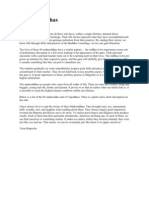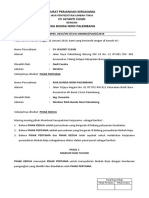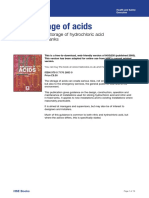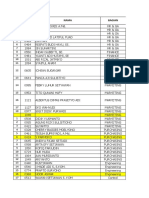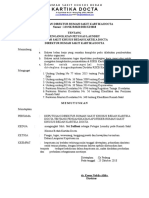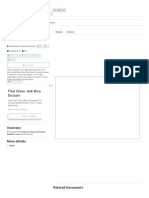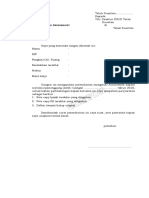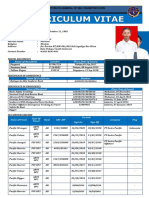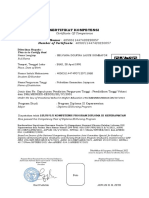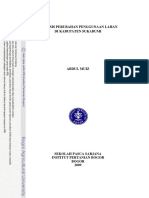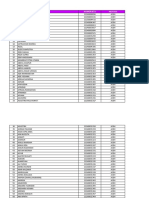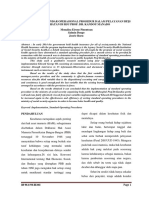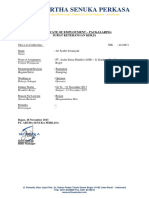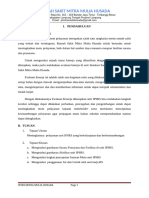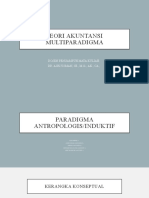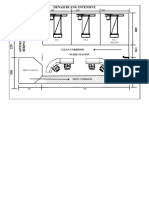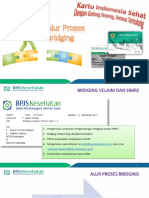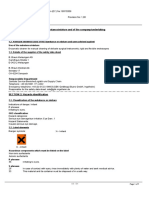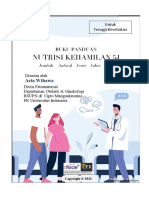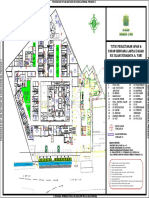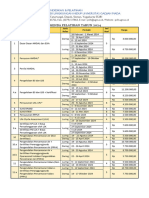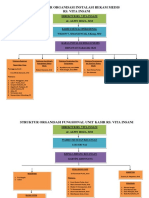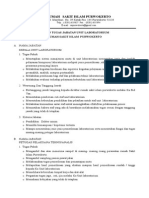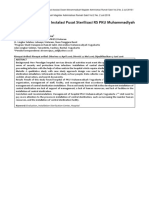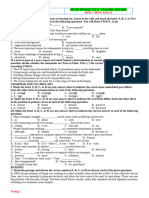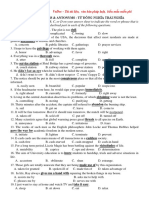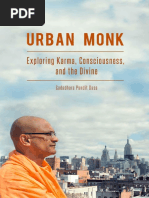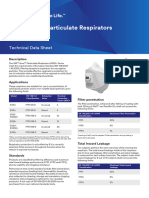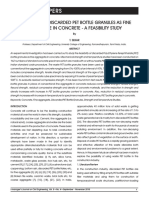Soal STMKG B.inggris
Soal STMKG B.inggris
Uploaded by
M Iqbalz EternalschoolboyCopyright:
Available Formats
Soal STMKG B.inggris
Soal STMKG B.inggris
Uploaded by
M Iqbalz EternalschoolboyOriginal Description:
Original Title
Copyright
Available Formats
Share this document
Did you find this document useful?
Is this content inappropriate?
Copyright:
Available Formats
Soal STMKG B.inggris
Soal STMKG B.inggris
Uploaded by
M Iqbalz EternalschoolboyCopyright:
Available Formats
SOAL STMKG 2018 2018
BAHASA INGGRIS
SECTION 1 : STRUCTURE (1 - 20)
1. The horizontal pendulum has arod … suspended at two points so it swings on a
horizontal plane.
A. With a mass on its end which is
B. With a mass on it end which is
C. With mass on its end which is
D. With a mass on its end which
E. With a mass its end which is
2. A seismograph is an instrument that records the shaking of the earth’s surface … by
seismic waves.
A. Casual
B. Caused
C. Because
D. Because of
E. The casual of
3. Jupiter’s four moons … through a telescope by Galileo
A. Were being first viewed
B. First viewed
C. Had been first viewed
D. Had first viewed
E. First being viewed
4. Hilda : Does the earth turn around and around?
Beny : Yes, Hilda. The earth spins around and around on its axis as it circles the sun.
The earth _______ rapidly at this moment.
A. Spinning
B. Get spinning
C. Is spinning
D. Went spinning
E. Spins
LBB – INDONESIA SMART Page 1
JL. Kusbini blok H-60 Klitren Yogyakarta, Tlp: (0274) 5016239
SOAL STMKG 2018 2018
Choose the one word or phrase that keeps in the meaning of the original sentences if it
subtitutes for the underline word or phrase.
5. A cross is a geometrical figure consisting essentially of two lines that intersect to form
right angles.
A. Circle
B. Crash
C. Crisscross
D. Cut
E. Create
6. Imagine the advertiser’s chagrin when he realized that he had put the wrong date in
the ad.
A. Humiliation
B. Indifference
C. Surprise
D. Anger
E. Annoy
7. Volunteer firefighters valiantly tried to extinguish the raging forest fire
A. Wrecthed
B. Sluggish
C. Intense
D. Riling
E. Moderate
Identify the one word or phrase that must be changed in order for the sentence to be
correct.(8 - 10)
8. Back- building Thunderstorm is a thunderstorm in which new development takes
A
place on the upwind side ( usually the west or southwest side ), such that the storm
B C
seem to remain stationary or propogate in backward direction.
D E
LBB – INDONESIA SMART Page 2
JL. Kusbini blok H-60 Klitren Yogyakarta, Tlp: (0274) 5016239
SOAL STMKG 2018 2018
9. Cumolonimbus cloud, characterized by strong vertical development in the form of
A B
mountains or huge tower topped at least partially by a smooth, flat, often fibrous
C D
anvil. Also know colloquially as a “thunderhead”.
E
10. Convective Temperature is the approximate temperature that the air near the ground
A B
must warm to in order to surface-based convection to develop, based analysis of
C D E
sounding.
11. Shhh Rafathar is sleeping. He ______ for ten hours every night.
A. Is sleeping
B. Was sleeping
C. Has sleeping
D. Sleeps
E. Sleeping
12. Right now I am looking at the board. I _____ some words on the boards.
A. Seeing
B. Is seeing
C. See
D. Saw
E. Seen
13. Right now the children are at the beach. They are having a good time. They ______ a
beach ball and they are playing catch with it.
A. Have
B. Are having
C. Must have
D. Should have
E. Already have
14. Once upon a time, a king and his three daughters lived in a castle. One day the king
was _______ about an idea. He formed a plan for finding husbands for them.
A. Think
B. Thinking
LBB – INDONESIA SMART Page 3
JL. Kusbini blok H-60 Klitren Yogyakarta, Tlp: (0274) 5016239
SOAL STMKG 2018 2018
C. Thinked
D. Been thinking
E. Being thinked
15. Agung ________ in Pondok Betung since June first.
A. Had been
B. Has been
C. Had being
D. Has being
E. Is being
16. Question : Whose Seismology book on the desk?
Noun Clause:
A. Tell me whose Seismology book are on the desk.
B. Tell me whose Seismology book is on the desk.
C. Tell me which Seismology book are on the desk.
D. Tell me whose on the desk are Seismology book.
E. Tell me who on the desk are Seismology book.
17. Active : You shouldn’t pronounce the “k” in “know”. 289
Passive : The “k” in “know” __________
A. Shouldn’t be pronounced.
B. Should be pronounced.
C. Shouldn’t be pronounce.
D. Should be pronounce.
E. You should pronounce.
18. The first cheese we probably made in Asia around four thousand years ago. Today it
is eaten in almost all the countries of the world.
________________________________
A. It can be eat alone, or it may be eat with bread.
B. It can be eaten alone, or it may be eaten with bread.
C. People can eat it alone or they may eat it with bread.
D. People can eats it alone or they may eat it with bread.
E. People can eats it alone or they may eats it with bread.
LBB – INDONESIA SMART Page 4
JL. Kusbini blok H-60 Klitren Yogyakarta, Tlp: (0274) 5016239
SOAL STMKG 2018 2018
19. “Jono is a lazy boy.” “Yes, he always wants_______ for him.”
A. Everything is done
B. To have everything done
C. Having everything done
D. Having everything been done
E. Having everything to be done
20. “The enemy is getting closer! We must _________!
A. Have the gun loaded
B. Had the loaded
C. Have loaded the gun
D. To have the gun loaded
E. Have had the gun loaded
SECTION 2 : READING
Passage A
Secondhand smoke is the smoke that is exhaled or that comes from the burning end of a
cigarette, pipe, or cigar. Secondhand smoke can come in through cracks in the walls. It can
hang around in hallways and doorways where people have been smoking. Breathing someone
else’s smoke can be deadly, especially if you live or work in a place where people smoke.
That is why it is so important for smokers to go all the way outside if they want a cigarette.
When one person smokes inside, it can cause problems for everyone else. Children who are
around tobacco smoke in their homes have more health problems like asthma and ear
infections. They are sicker and stay in bed more. They miss more school days than children
whose homes are smoke-free. Babies who live in homes with secondhand smoke are more
likely to die as infants than other babies.
Passage B
The first conclusive evidence on the danger of passive smoking came from Takeshi
Hirayama’s study in 1981 on lung cancer in non smoking Japanese women married to men
who smoked. Although the tobacco industry immediately launched a multi million dollar
campaign to discredit the evidence, dozens of further studies have confirmed the link.
Research then broadened into other areas and new scientific evidence continues to
accumulate. The risk of lung cancer in nonsmokers exposed to passive smoking is increased
by between 20 and 30 percent, and the excess risk of heart disease is 23 percent. Children are
at particular risk from adults’ smoking. Adverse health effects include pneumonia and
bronchitis, coughing and wheezing, worsening of asthma, middle ear diseases, and
LBB – INDONESIA SMART Page 5
JL. Kusbini blok H-60 Klitren Yogyakarta, Tlp: (0274) 5016239
SOAL STMKG 2018 2018
possibly neuro-behavioural impairment and cardiovascular diseases in adulthood. A pregnant
woman’s exposure to other people’s smoking can harm her fetus. The effects are
compounded when the child is exposed to passive smoking after birth.
21. Which of the following themes is mainly discussed in the passages?
A. The illnesses linked to passive smoking.
B. The disadvantages of smoking.
C. The danger of becoming smokers
D. The benefit of being a non smoker
E. The danger of being a passive smoker
22. Which of the following opinions is mentioned in both passages?
A. Serious diseases in smokers may result from chain smoking.
B. Active smokers’ smoke endangers passive smokers.
C. Smoking endangers smokers living with nonsmokers.
D. Evidence on the danger of passive smoking is conclusive.
E. Smoking affects the health of a baby of a pregnant woman.
23. The idea of Passage A is similar to that of Passage B, in that it is ... .
A. a chance to escape from several deadly illnesses due to smoking.
B. A good decision for smokers to live without smoking habits.
C. A great benefit for pregnant woman to live without smoking.
D. An unfortunate for nonsmokers to live without smoking habits
E. A list of several health risks for nonsmokers who live with smokers.
24. Both passages can be best summarized as which of the following?
A. Smokers and non-smokers are likely to get smoking-related diseases.
B. Children and pregnant women tend to get various diseases
C. Children of smoking pregnant women will be likely to smoke.
D. Many smokers will not have serious health problems in their life.
E. Non-smokers living with smokers are likely to get health problems.
25. Based on the passages, it can be hypotheszed that ... .
A. by avoiding passive smoking, chances of getting deadly illnesses are lesser.
B. More people will surely die in the environment of smokers.
C. Home settings determine whether somebody will smoke or not.
D. A baby born from a mother who smokes will tend to be a smoker.
E. Evidence of lung cancer will be greater in the baby of a smoking mother.
LBB – INDONESIA SMART Page 6
JL. Kusbini blok H-60 Klitren Yogyakarta, Tlp: (0274) 5016239
SOAL STMKG 2018 2018
In their latest paper, published in the journal Nature Climate Change, Prof. Philip
Munday and colleagues report world-first evidence that high CO2 levels in sea water disrupts
a key brain receptor in fish, causing marked changes in their behavior and sensory ability.
They began by studying how baby clown and damsel fishes performed alongside their
predators in CO2 enriched water. They found that, while the predators were somewhat
affected, the baby fish suffered much higher rates of attrition.
“Our early work showed that the senses of smell of baby fish was harmed by higher
CO2 in the water, meaning they found it harder to locate a reef to settle on or detect the
warning smell of a predator fish. But we suspected there was much more to it than the loss of
ability to smell, “ says Prof. Munday. The team then examined whether fish’s senses of
hearing which are used to locate and hone in on reefs at night, and avoid them during the day
was affected. “ The answer is, yes it was. They were confused and no longer avoided reef
sounds during the day. Being attracted to reef during daylight would make them easy meat
for predators”
Their work showed the fish also tended to lose their natural instinct to turn left or
right which is an important factor in schooling behaviour which also makes them more
vulnerable, as lone fish are easily eaten by predators. Prof. Munday further explains, “All this
led us to suspect it wasn't simply damage to their individual senses that was going on -but
rather, that higher levels of carbon dioxide were affecting their whole central nervous
system”.
26. What is the writer’s purpose in writing the passage ?
A. To investigate the increase of carbon dioxide level in sea water.
B. To contrast the influence of carbon dioxide on predators and fish.
C. To predict the impacts of poor senses of fishes on coral reefs.
D. To inform the effects of high carbon dioxide in sea water on fish.
E. To argue over the agility of fish exposed to high carbon dioxide.
27. Paragraphs 2 and 3 are related in that the first ... .
A. argues for causes; the latter deals with conclusion.
B. Describes loss of senses; the latter loss of reactions.
C. Deals with causes; the latter presents further evidence.
D. Theorizes the role of O2; the latter describes the effect.
E. Lists the results of the study; the latter explains the results.
LBB – INDONESIA SMART Page 7
JL. Kusbini blok H-60 Klitren Yogyakarta, Tlp: (0274) 5016239
SOAL STMKG 2018 2018
28. The word “them” in’ ... and avoid them during the day ... ‘ (paragraph 2 line 9) refers
to ...
A. CO2 levels
B. Predators
C. baby fish
D. the team
E. Reefs
29. The following is relevant with the idea of the role of the fish’s senses and instinct
described in the passage except... .
A. mice avoid poisons by smelling it.
B. Dogs sniff rubbles to identify disaster victims.
C. People recognize others from their voices.
D. Babies learn to speak by imitating sound.
E. Pigeons send letter to an address.
30. regarding higher levels of carbon dioxide in sea water is, the author seems to feel very
...
A. concerned.
B. Upset.
C. Weary.
D. Excited.
E. Uncaring.
LBB – INDONESIA SMART Page 8
JL. Kusbini blok H-60 Klitren Yogyakarta, Tlp: (0274) 5016239
You might also like
- 84 MahasiddhasDocument98 pages84 Mahasiddhastradicionalista100% (4)
- Ten Vocal CommandmentsDocument7 pagesTen Vocal Commandmentsapi-235049943No ratings yet
- Mou Limbah TinjaDocument3 pagesMou Limbah Tinjaheni maikuriNo ratings yet
- HSE - Bulk Storage of AcidsDocument19 pagesHSE - Bulk Storage of AcidsvictorvikramNo ratings yet
- DaathDocument2 pagesDaathapi-3725832100% (2)
- Daftar Peralatan Yang Dibutuhkan Untuk RS Tipe C Sesuai Dengan Permenkes 56 Tahun 2014Document16 pagesDaftar Peralatan Yang Dibutuhkan Untuk RS Tipe C Sesuai Dengan Permenkes 56 Tahun 2014Agustina DestrianaNo ratings yet
- MSDS RenalinDocument8 pagesMSDS RenalinPapah Dede100% (1)
- Spesifikasi Teknis SiroDocument5 pagesSpesifikasi Teknis SiroIPIN Hi. PAYONo ratings yet
- NO QTY Nama Barang Merk Price, IDR Peralatan Uji Silang Metode Gel TestDocument6 pagesNO QTY Nama Barang Merk Price, IDR Peralatan Uji Silang Metode Gel TestKalbaridahNo ratings yet
- Format Rekap Kubota 2020Document86 pagesFormat Rekap Kubota 2020BagasNo ratings yet
- Cytogard Cytotoxic Cabinet PDFDocument5 pagesCytogard Cytotoxic Cabinet PDFAgus MarsyalNo ratings yet
- Tabel PV PDFDocument10 pagesTabel PV PDFnova anita sekarwatiNo ratings yet
- Omechanics Wellbore Stability Analysis in Successful Drilling of A Challenging HPHT Exploration Well in North SumatraDocument21 pagesOmechanics Wellbore Stability Analysis in Successful Drilling of A Challenging HPHT Exploration Well in North SumatraHerry SuhartomoNo ratings yet
- SK LaundryDocument2 pagesSK LaundryWidya Novi SNo ratings yet
- Spesifikasi Inami Slit Lamp L-0189Document1 pageSpesifikasi Inami Slit Lamp L-0189Heppy YulianitaNo ratings yet
- Pedoman Pengorganisasian Ambulan 1.docx (2nv55pgy0rlk)Document4 pagesPedoman Pengorganisasian Ambulan 1.docx (2nv55pgy0rlk)Embang NababanNo ratings yet
- Instrumen Self Assessment Izin Operasional Rumah Sakit Kelas DDocument3 pagesInstrumen Self Assessment Izin Operasional Rumah Sakit Kelas DAnantaFxNo ratings yet
- Assessment BidyanmedDocument3 pagesAssessment BidyanmedDyni Ayu LestariNo ratings yet
- Dokumen - Tips - Form Rawat Jalan PDFDocument2 pagesDokumen - Tips - Form Rawat Jalan PDFYunita Yozpin AyanknyaRizalNo ratings yet
- Visi Dan Misi Rsud MatramanDocument2 pagesVisi Dan Misi Rsud MatramanErni Yessyca SimamoraNo ratings yet
- Spesifikasi Barang Medis Habis Pakai Reagen Laboratorium TA. 2021Document3 pagesSpesifikasi Barang Medis Habis Pakai Reagen Laboratorium TA. 2021Mandalika Putri PratamaNo ratings yet
- Jiia, Volume 6 No. 4, November 2018Document8 pagesJiia, Volume 6 No. 4, November 2018Franny Adrian MasliNo ratings yet
- Jambu Mete Di Sulawesi TenggaraDocument18 pagesJambu Mete Di Sulawesi TenggaraYusnan Arif100% (1)
- MSDS CreatinineDocument21 pagesMSDS Creatinineaji koplayer100% (1)
- Curriculum Vitae: Directorate General of Sea Transportation "Indonesian Seafarer"Document2 pagesCurriculum Vitae: Directorate General of Sea Transportation "Indonesian Seafarer"Wanty AswantieNo ratings yet
- ID Profil Usaha Industri Batu Bata Study Kasus Usaha Batu Bata Rohima Di PekanbaruDocument11 pagesID Profil Usaha Industri Batu Bata Study Kasus Usaha Batu Bata Rohima Di PekanbaruFahrul ImadenardaNo ratings yet
- Bagan TandingDocument8 pagesBagan Tandingmayonknet01No ratings yet
- Serkom Selvia KombayorDocument1 pageSerkom Selvia KombayorJUNAIDI IBNU HAJARNo ratings yet
- Jam Pelayanan KlinikDocument6 pagesJam Pelayanan Klinikrio ariefkaniNo ratings yet
- Master Laporan Orientasi Khusus DriverDocument2 pagesMaster Laporan Orientasi Khusus DriverLina Ayu PramatasariNo ratings yet
- 2009amu PDFDocument156 pages2009amu PDFLalu SaefullahNo ratings yet
- Data Total KTA 5 Des 2018 PDFDocument773 pagesData Total KTA 5 Des 2018 PDFkikiNo ratings yet
- Regulasi Dan Dokumen MFK SNARS 1.1Document20 pagesRegulasi Dan Dokumen MFK SNARS 1.1agungrudiardiNo ratings yet
- Sop Pelayanan Bpjs Kesehatan Di Rs Kondue Manado.Document12 pagesSop Pelayanan Bpjs Kesehatan Di Rs Kondue Manado.Orlando Jonathan100% (2)
- Contoh Term of ReferenceDocument14 pagesContoh Term of ReferenceUtsukushii HitoNo ratings yet
- Paklaring ArthaDocument1 pagePaklaring Arthaadrf1999No ratings yet
- Laporan Ipsrs SeptDocument7 pagesLaporan Ipsrs SeptekaNo ratings yet
- Spesifikasi Ambulance Transport Standar DepKes PDFDocument1 pageSpesifikasi Ambulance Transport Standar DepKes PDFagung kurniawanNo ratings yet
- Ppt. Kelompok 1 - Paradigma Antropologi - InduktifDocument4 pagesPpt. Kelompok 1 - Paradigma Antropologi - InduktifanrassNo ratings yet
- Contoh Denah ICUDocument2 pagesContoh Denah ICUAhmed RidoNo ratings yet
- IHITool QIProjectMeasuresWorksheetDocument3 pagesIHITool QIProjectMeasuresWorksheetDiah PutriNo ratings yet
- SK Pembentukan Tim GeriatriDocument3 pagesSK Pembentukan Tim GeriatriMega AlentaNo ratings yet
- Bridging VClaim - 2Document7 pagesBridging VClaim - 2jujukonohaNo ratings yet
- Presentasi SNARS1Document16 pagesPresentasi SNARS1Annisa Aisyha Malik50% (2)
- Judul SS3 Cydex AllDocument125 pagesJudul SS3 Cydex AllGoez Aditya Nugraha100% (1)
- MSDS HelizymeDocument7 pagesMSDS HelizymeAnonymous tbJ24554No ratings yet
- Analisis Keuntungan Dan Kendala Penerapan Konsep Sistem Pertanian Terpadu (SPT) Di IndonesiaDocument10 pagesAnalisis Keuntungan Dan Kendala Penerapan Konsep Sistem Pertanian Terpadu (SPT) Di IndonesiawandyNo ratings yet
- Buku Panduan Nutrisi 5J Untuk Tenaga KesehatanDocument93 pagesBuku Panduan Nutrisi 5J Untuk Tenaga KesehatanAntonius WibowoNo ratings yet
- Score TOEFLDocument1 pageScore TOEFLsilvianahendriNo ratings yet
- Titik Perletakan Apar & Papan Bencana Lantai Dasar Rs Islam Surabaya A. YaniDocument8 pagesTitik Perletakan Apar & Papan Bencana Lantai Dasar Rs Islam Surabaya A. Yaniaugust dhienNo ratings yet
- Agenda Pelatihan PSLH UGM 2024Document3 pagesAgenda Pelatihan PSLH UGM 2024waridilmiNo ratings yet
- Meeting 5Document13 pagesMeeting 5Priyadi As SaridinNo ratings yet
- MSDS of Chlorhexidine AcetateDocument7 pagesMSDS of Chlorhexidine AcetateDiorama BaliNo ratings yet
- RS Vita InsaniDocument5 pagesRS Vita InsaniDina WulandariNo ratings yet
- Uraian Tugas Jabatan Unit LaboratoriumDocument2 pagesUraian Tugas Jabatan Unit LaboratoriumDyah Arum KusumaningtyasNo ratings yet
- CSSD 12Document10 pagesCSSD 12Anonymous 8GM5qYMTgNo ratings yet
- KX T7730 Manual PDFDocument16 pagesKX T7730 Manual PDFpatramaleNo ratings yet
- Evaluation TestDocument7 pagesEvaluation TestAnh NgoNo ratings yet
- DE 7-On-Thi-HK2-ANH-11-GLOBAL-SUCCESSDocument2 pagesDE 7-On-Thi-HK2-ANH-11-GLOBAL-SUCCESSMây NguyễnNo ratings yet
- Tài liệu ôn thi chuyên Tiếng Anh Đề 5Document6 pagesTài liệu ôn thi chuyên Tiếng Anh Đề 5Hoàng Phương ThảoNo ratings yet
- E8 Revision 2nd Midterm 21.22Document4 pagesE8 Revision 2nd Midterm 21.22Minh Hien Do100% (1)
- Bai Tap Tieng Anh Ve Tu Dong Nghia Trai NghiaDocument7 pagesBai Tap Tieng Anh Ve Tu Dong Nghia Trai NghiaThuNo ratings yet
- Giua Ki So 4 - So 2.chuaDocument5 pagesGiua Ki So 4 - So 2.chuabảo thư nguyễnNo ratings yet
- I2Document5 pagesI2Pham TaylorNo ratings yet
- Niño P. Llagoso Bit-Automotive 1B EveningDocument4 pagesNiño P. Llagoso Bit-Automotive 1B EveningNiño LlagosoNo ratings yet
- Bruker Eds Quantax BrochureDocument16 pagesBruker Eds Quantax BrochureMoh Nuim BarryNo ratings yet
- Urban Monk Exploring Karma Consciousness and The Divine Gadadhara Pandit Dasa Compress (001 030)Document30 pagesUrban Monk Exploring Karma Consciousness and The Divine Gadadhara Pandit Dasa Compress (001 030)Diego RincónNo ratings yet
- Remembering Your Past Lives Using Candles and MeditationDocument6 pagesRemembering Your Past Lives Using Candles and Meditationhttp://www.whatis-theplan.org/No ratings yet
- Fluke 15B 17B 18B (+) Meter User's ManualDocument28 pagesFluke 15B 17B 18B (+) Meter User's ManualmrzorbatronNo ratings yet
- Project Bayonne US 345 KV XLPE Subm PDFDocument2 pagesProject Bayonne US 345 KV XLPE Subm PDFistenicNo ratings yet
- Technical Brochure ProteinesDocument7 pagesTechnical Brochure ProteinesNelson Veintemilla0% (1)
- 3M PSD 9300+ Datasheet EN EU MasterDocument4 pages3M PSD 9300+ Datasheet EN EU MasterEDINA MOSCOTENo ratings yet
- "Study of Brand Promotion of Jaypee Cement": Project Report ONDocument61 pages"Study of Brand Promotion of Jaypee Cement": Project Report ONAmar Rajput100% (1)
- Nail Cakirhan - TurkeyDocument67 pagesNail Cakirhan - TurkeyDavit J VichtoraNo ratings yet
- TicketDocument3 pagesTicketayushpandey12344.apNo ratings yet
- Tertre Granulation Plant:: NH3 Acidic Purge of Scrubbing Section SprayersDocument11 pagesTertre Granulation Plant:: NH3 Acidic Purge of Scrubbing Section SprayersMagdy SalehNo ratings yet
- CommandsDocument7 pagesCommandssafvaNo ratings yet
- BSPMerit BadgesDocument31 pagesBSPMerit Badgesrogelio banuaNo ratings yet
- Pedometron, Issue 36Document35 pagesPedometron, Issue 36Scary CreaturesNo ratings yet
- Msis34 HSC Code 2000 2008 Itos Rev1.01-Full-2 PDFDocument380 pagesMsis34 HSC Code 2000 2008 Itos Rev1.01-Full-2 PDFCristhian Huanqui TapiaNo ratings yet
- HRRS-5KV Manual ProductoDocument15 pagesHRRS-5KV Manual Productocorriente sumincolNo ratings yet
- Azimuth PointDocument13 pagesAzimuth PointChriss Jobin100% (1)
- InteractionsDocument8 pagesInteractionsLorinda SorensenNo ratings yet
- Design of Hollow Block Slabs: Dr. Hamed HadhoudDocument19 pagesDesign of Hollow Block Slabs: Dr. Hamed HadhoudFady Abdel AzizNo ratings yet
- UPF ExampleDocument6 pagesUPF ExampleShashank Shrivastava100% (1)
- Thesis Presentation - Onkar BhoiteDocument8 pagesThesis Presentation - Onkar BhoiteRITIK BHARDWAJNo ratings yet
- Irrigation Management: Basic PrinciplesDocument8 pagesIrrigation Management: Basic Principles1milesNo ratings yet
- Research Papers: Utilization of Discarded Pet Bottle Granules As Fine Aggregate in Concrete - A Feasibility StudyDocument1 pageResearch Papers: Utilization of Discarded Pet Bottle Granules As Fine Aggregate in Concrete - A Feasibility StudyKier Christian LimNo ratings yet
- From The Perspective of PhilosophyDocument11 pagesFrom The Perspective of PhilosophyArgieline FernandezNo ratings yet
- Face Emotion Based Music Player SystemDocument4 pagesFace Emotion Based Music Player SystemMisbah ShaikhNo ratings yet
